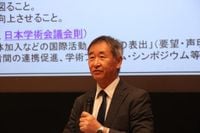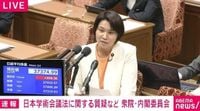On May 9, 2025, a pivotal moment unfolded in Japan’s legislative landscape as the House of Councillors' Cabinet Committee voted on the Japan Academy Law Bill, which aims to transform the Japan Academy from a "special state institution" into a special corporation. This change, supported by the ruling Liberal Democratic Party (LDP) and Komeito, has sparked intense debate and concern regarding the autonomy and independence of academic institutions in Japan.
During the committee session, Representative Tomoko Ichirai of the Constitutional Democratic Party (CDP) pressed Minister of Education, Culture, Sports, Science and Technology, Masahiro Sakai, on the implications of this bill. Ichirai referenced a previous hearing where expert Nagata emphasized the necessity for the independence of supervisors, arguing that individuals with no conflicts of interest should be appointed. "Government officials should not be placed in supervisory positions," Ichirai asserted, seeking a commitment from Sakai to this effect.
In response, Minister Sakai stated, "I don't think it's something that should be prohibited across the board," highlighting a significant divide in perspectives regarding the role of government officials in academic oversight. Ichirai further questioned whether the Prime Minister's process for selecting supervisors would be documented, to which Takeshi Sasakawa, a Cabinet Office Councillor, replied that while the decision-making process might not be formally recorded due to its personnel nature, the Prime Minister would consider the matter appropriately.
As the debate continued, Ichirai insisted that given the strong criticism regarding the authority of supervisors, there should be documentation of the Prime Minister's selection process. Minister Sakai defended the bill, asserting that the authority of supervisors would be similar to that of directors in other corporations and that their roles would not impose undue pressure on the Japan Academy's activities.
Despite the concerns raised, the Japan Academy Law Bill was adopted by a majority vote in the Cabinet Committee, with the support of the LDP and Nippon Ishin no Kai, signaling a significant shift in the governance of Japan’s academic institutions.
The proposed changes have drawn sharp criticism from opposition parties, including the CDP and the Communist Party, who argue that the bill undermines "freedom of learning" as guaranteed by the Constitution. Kazunori Shigetoku, Policy Research Chairman of the CDP, expressed profound concerns, stating, "The independence of the Japan Academy, which is crucial as the 'scholars' parliament,' is at serious risk." He pointed out that the impetus for this legal revision stemmed from former Prime Minister Yoshihide Suga's controversial rejection of six candidates for membership in 2020, arguing that the government has since used "personnel confidentiality" as a shield to avoid accountability.
Shigetoku further criticized the bill for creating a convoluted structure that would allow government intervention in the Academy's operations and personnel decisions. He called for fundamental amendments to ensure the Japan Academy's independence in future deliberations.
On the same day, local activists gathered in Nagano City, organized by the "Prefectural People's Roundtable to Open Up Japan and Shinshu," to advocate against the bill. Their street campaign, conducted in front of Nagano Station, aimed to raise public awareness about the potential erosion of the Academy's autonomy. They argued that the bill would significantly undermine the independence of academic institutions, emphasizing that there has not been enough public discussion on the matter.
Parallel to these developments, a lecture titled "Concerns about the Corporatization Bill of the Science Council of Japan" was held on May 8, 2025, at the University of Tokyo. Takaaki Kajita, a prominent figure and former President of the Science Council of Japan, delivered a compelling presentation, warning that the proposed amendments could have far-reaching consequences not only for the Japan Academy but for the entire academic community in Japan.
During his lecture, Kajita stressed the importance of the Japan Academy as a national institution that provides crucial advisory functions to the government and engages in international academic exchanges. He lamented that the current bill does not guarantee the advisory role of the Academy to the Diet, even as it seeks to corporatize the institution. Kajita highlighted several critical issues with the bill, including the uncertainty of its contribution to Japan's academic development, the potential alteration of the Academy's foundational principles, and the unclear rationale for its corporatization.
Moreover, he pointed out the troubling implications of institutionalizing multiple layers of government oversight and the involvement of external parties in member selection processes, which should be determined internally. Kajita's insights resonated with the audience, many of whom were students eager to understand the legislative changes affecting their academic environment.
The Japan Academy Law Bill's approval is seen as a watershed moment, drawing attention not only from within Japan but also from international academic communities. On May 6, 2025, Kajita revealed that the International Science Council had expressed deep concerns regarding the Japanese government's attempts to interfere in the Japan Academy's operations and member selection processes.
As discussions surrounding the bill continue, the implications for academic freedom and institutional independence remain at the forefront of public discourse. The ongoing debates reflect a broader struggle over the role of government in academia and the safeguarding of intellectual autonomy in Japan.
With the Cabinet Committee's approval, the future of the Japan Academy hangs in the balance, prompting calls for increased transparency and accountability in the selection processes that govern its operations. As the legislative journey continues, stakeholders from various sectors will undoubtedly keep a close watch on how these changes will shape the landscape of academic governance in Japan.






